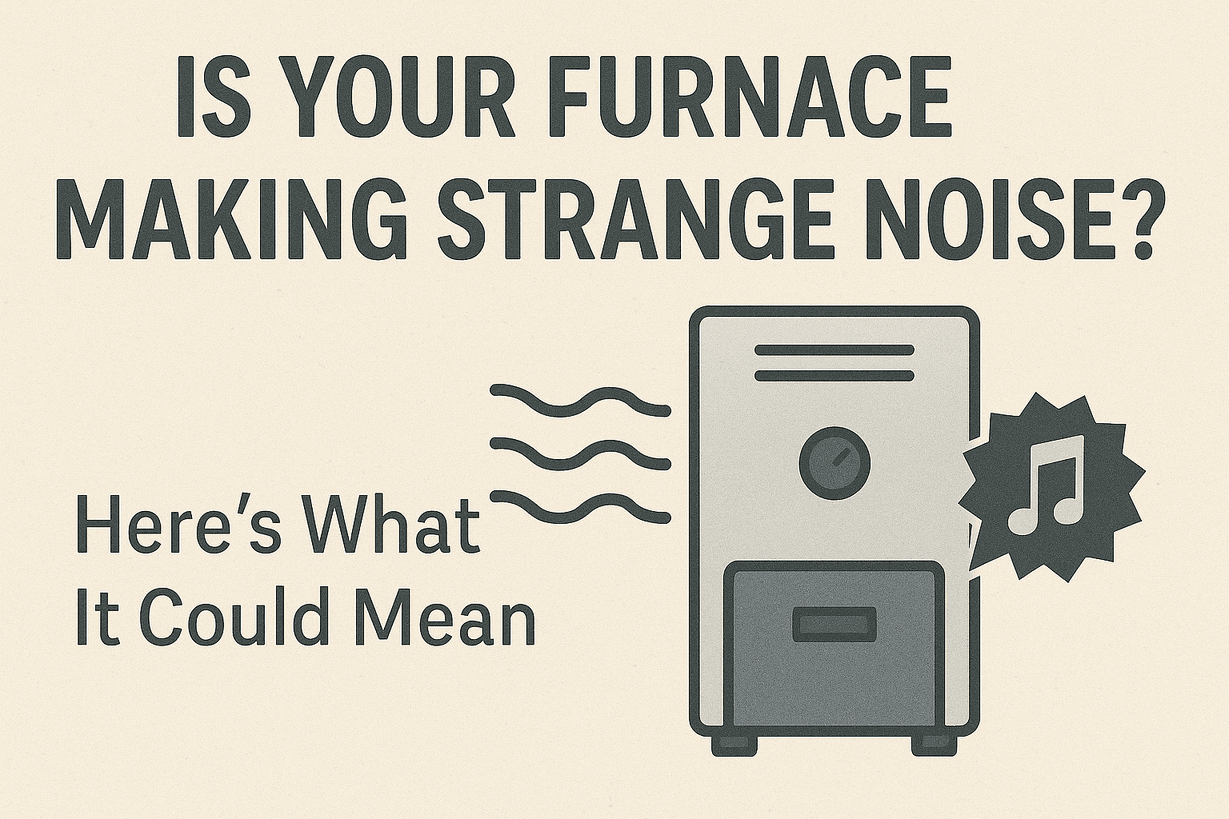When the comfort of your home is threatened by strange furnace noises, it’s not just inconvenient—it could be a sign of a serious issue. Understanding what those furnace sounds mean can help you prevent costly repairs and ensure your home stays warm and safe. Below, we break down the most common furnace noises and what each might indicate.
Banging or Booming Noises: Delayed Ignition
One of the most alarming furnace noises is a loud bang or boom when the unit starts up. This is often caused by delayed ignition, which occurs when gas builds up in the combustion chamber before igniting. When it finally ignites, the excess gas causes a small explosion.
Causes of delayed ignition include:
- Dirty burners
- Low gas pressure
- Faulty ignition system
Why it matters: Delayed ignition is dangerous. It can crack the heat exchanger, leading to costly repairs or even carbon monoxide leaks. If you hear a booming noise, shut off the system and call an HVAC technician immediately.
Screeching or Squealing: Belt or Motor Issues
A high-pitched screeching or squealing sound is usually a mechanical issue. This noise is most commonly caused by:
- A worn-out or slipping blower belt
- Dry motor bearings
- Malfunctioning blower motor
Solution: In many cases, lubricating the motor or replacing the belt will fix the issue. However, ignoring it may lead to motor failure, which is significantly more expensive to repair.
Rattling Sounds: Loose Components or Panels
If you hear a rattling sound coming from your furnace, it could be something as minor as a loose screw or as serious as a broken heat exchanger. Here are potential causes:
- Loose access panels
- Disconnected ductwork
- Cracked or broken components
Tip: Check if the furnace panels are tightly secured. If the rattling persists, have the unit inspected to avoid escalating damage.
Clicking Sounds: Ignition Problems or Relay Issues
Clicking is normal during ignition, but if it continues while the furnace runs or after it shuts off, there could be a problem.
Potential issues include:
- Failing ignition system
- Faulty flame sensor
- Malfunctioning thermostat or control board
Persistent clicking may mean the furnace is struggling to ignite. This can lead to short cycling, where the unit turns on and off rapidly, reducing its lifespan.
Humming or Buzzing: Electrical or Transformer Concerns
A low humming sound can indicate normal operation, but loud buzzing or persistent humming often points to electrical issues, such as:
- A failing blower motor
- Loose wiring or faulty capacitor
- A malfunctioning transformer
These problems can worsen quickly. Always address electrical noises right away to prevent fire hazards and system failure.
Whistling or Whooshing: Airflow Restrictions
If your furnace is making a whistling or whooshing sound, it’s likely due to restricted airflow. This can result from:
- Clogged or dirty air filters
- Closed or blocked vents
- Leaks in the ductwork
Fixing this is often simple—start by changing your furnace filter. If that doesn’t resolve it, a professional may need to inspect the duct system.
Chirping or Tapping: Minor Startup Sounds or Motor Bearings
Some furnaces make chirping noises during startup, especially after long periods of disuse (like at the beginning of winter). These sounds are typically harmless and disappear as the unit warms up.
However, if tapping or chirping persists, it might signal:
- Worn-out bearings
- Foreign debris in the blower fan
Consistent tapping should be checked by a technician to rule out potential damage to the blower assembly.
Thumping or Knocking: Unbalanced Blower Wheel
A repetitive thumping or knocking noise could point to an unbalanced blower wheel. The blower wheel might have debris caught in it or could be loose on the motor shaft.
Over time, this can cause wear on the motor and result in reduced efficiency or complete failure.
Recommended action: Turn off your furnace and have a technician inspect and balance the blower assembly.
Metallic Scraping: Damaged Blower Wheel or Motor Mount
A harsh scraping or grinding noise is one of the most serious sounds your furnace can make. It typically indicates that metal is scraping against metal, such as:
- Loose blower wheel rubbing against the housing
- Broken motor mounts allowing movement
- Worn motor bearings
This requires immediate attention. Turn off the furnace and avoid using it until it’s been inspected. Continuing to run the unit could lead to a full system breakdown.
How to Respond to Strange Furnace Noises
When your furnace starts making unfamiliar sounds, don’t ignore them. Take proactive steps:
- Turn off the system if the noise is loud, continuous, or concerning.
- Inspect filters, panels, and vents to rule out simple causes.
- Call a certified HVAC professional to diagnose and fix the problem.
Preventive maintenance can reduce the chances of unexpected breakdowns. Annual inspections and tune-ups help catch issues early and extend the life of your heating system.
When to Consider Furnace Replacement
Sometimes, furnace noises indicate that the unit is nearing the end of its life. If your furnace is over 15-20 years old, frequently breaks down, or makes multiple concerning noises, it might be more cost-effective to replace it.
Modern high-efficiency furnaces are quieter, use less energy, and offer better comfort control than older models. Replacing your aging system before it fails can save you from emergency repair costs and freezing nights.
Final Thoughts: Listen to What Your Furnace is Telling You
Furnace noises aren’t just background annoyances—they’re signals. Whether it’s a simple belt adjustment or a sign of dangerous combustion issues, early detection and response are crucial.
Pay attention to these sounds:
- Booming = ignition delay
- Screeching = motor or belt issue
- Rattling = loose parts
- Clicking = ignition or electrical fault
- Buzzing = electrical concern
- Whistling = airflow blockage
- Scraping = major internal damage
Your furnace keeps you warm—don’t let strange noises go unchecked. Ensure your system is operating safely, efficiently, and quietly.

